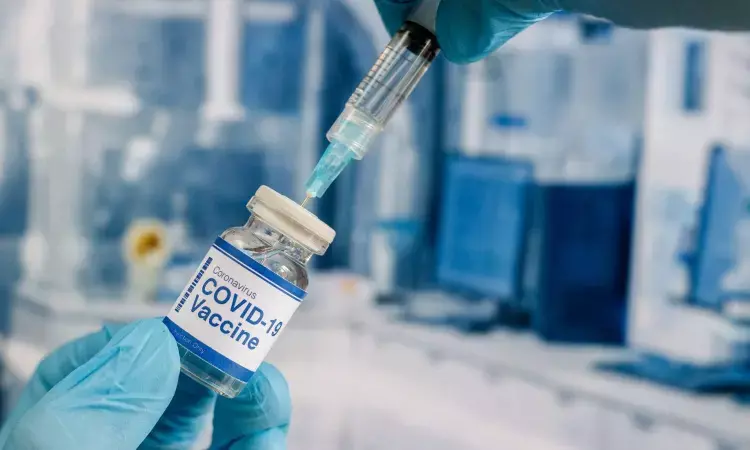- Home
- Medical news & Guidelines
- Anesthesiology
- Cardiology and CTVS
- Critical Care
- Dentistry
- Dermatology
- Diabetes and Endocrinology
- ENT
- Gastroenterology
- Medicine
- Nephrology
- Neurology
- Obstretics-Gynaecology
- Oncology
- Ophthalmology
- Orthopaedics
- Pediatrics-Neonatology
- Psychiatry
- Pulmonology
- Radiology
- Surgery
- Urology
- Laboratory Medicine
- Diet
- Nursing
- Paramedical
- Physiotherapy
- Health news
- Fact Check
- Bone Health Fact Check
- Brain Health Fact Check
- Cancer Related Fact Check
- Child Care Fact Check
- Dental and oral health fact check
- Diabetes and metabolic health fact check
- Diet and Nutrition Fact Check
- Eye and ENT Care Fact Check
- Fitness fact check
- Gut health fact check
- Heart health fact check
- Kidney health fact check
- Medical education fact check
- Men's health fact check
- Respiratory fact check
- Skin and hair care fact check
- Vaccine and Immunization fact check
- Women's health fact check
- AYUSH
- State News
- Andaman and Nicobar Islands
- Andhra Pradesh
- Arunachal Pradesh
- Assam
- Bihar
- Chandigarh
- Chattisgarh
- Dadra and Nagar Haveli
- Daman and Diu
- Delhi
- Goa
- Gujarat
- Haryana
- Himachal Pradesh
- Jammu & Kashmir
- Jharkhand
- Karnataka
- Kerala
- Ladakh
- Lakshadweep
- Madhya Pradesh
- Maharashtra
- Manipur
- Meghalaya
- Mizoram
- Nagaland
- Odisha
- Puducherry
- Punjab
- Rajasthan
- Sikkim
- Tamil Nadu
- Telangana
- Tripura
- Uttar Pradesh
- Uttrakhand
- West Bengal
- Medical Education
- Industry
Study provides reassuring data on the risk of kidney disease relapse after COVID-19 vaccination

Several reports have described a relapse of certain autoimmune kidney diseases in patients after they've received COVID-19 vaccines, but it's unclear if this association is real or a coincidence. In a recent population-level study published in JASN, investigators found that a second or third dose of COVID-19 vaccine was associated with higher relative risk but low absolute increased risk of disease relapse.
People with glomerular diseases-a group of autoimmune kidney disease that often require long-term treatment with medications that suppress the immune system—face a high risk of developing serious infections, and are more likely to experience complications of infections such as from COVID-19. As vaccination programs were rolled out, individual case reports began to emerge describing flares of glomerular disease that occurred within days to weeks of COVID-19 vaccines, suggesting the vaccine itself may have induced a flare of the autoimmune kidney disease. These reports were very limited and, in the absence of a control population, were unable to provide accurate estimates of the true risk of disease flare that may be associated with COVID-19 vaccines.
To provide clarity, a team led by Sean Barbour, MD, MSc (University of British Columbia) and Mark Canney, MD, PhD (University of Ottawa) studied information on all patients in British Columbia, Canada who had the following glomerular diseases: minimal change disease, focal segmental glomerulosclerosis, membranous nephropathy, IgA nephropathy, lupus nephritis, anti-neutrophil cytoplasmic antibody-related glomerulonephritis, and C3 glomerulonephritis. By capturing all patients with biopsy- confirmed glomerular disease in a centralized provincial database with linkage to both laboratory data and vaccination status over time, the researchers quantified the absolute and relative risk of glomerular disease relapse following COVID-19 vaccination.
The analysis identified 1,105 adults with glomerular disease that was stable when COVID-19 vaccines first became available. During 281 days of follow-up, 134 patients (12.1%) experienced a relapse. Although a first vaccine dose was not associated with relapse risk, exposure to a second or third dose was associated with a 2-fold higher relative risk of relapse; however, the absolute increase in risk of disease flare after these doses was still small, ranging from 1-5% depending on the type of glomerular disease. Most vaccine-associated disease flares were mild, with approximately 1 in 5 people needing any change in treatment.
"These results indicate that although COVID-19 vaccines may be associated with a small increase in risk of causing a flare of glomerular disease, this risk is very small, and the well-established benefits of vaccination more that outweigh these risks," said Dr. Barbour. "This should encourage people with glomerular disease to continue to get regular COVID-19 vaccinations. Our findings also suggest that people with glomerular disease should have careful monitoring after COVID-19 vaccinations to capture any early flare of their disease."
Dr. Barbour added that the study demonstrates how individual reports of vaccine side effects can result in unnecessary angst and worry amongst people deciding about whether to receive COVID-19 vaccines. Instead, proper studies need to be conducted to provide estimations of actual risk, so that people can be properly informed. "In this study, we confirmed initial reports of a potential complication of COVID-19 vaccines, however we also demonstrate that this risk is very small and the severity of the complication was quite mild," Dr. Barbour said.
An accompanying editorial notes that the findings provide important information when discussing the pros and cons of COVID-19 vaccination with patients with glomerular disease.
Reference:
Mark Canney, Mohammad Atiquzzaman, Amanda M. Cunningham, Yuyan Zheng, Lee Er, Steven Hawken, Yinshan Zhao and Sean J. Barbour JASN November 2022, ASN.2022030258; DOI: https://doi.org/10.1681/ASN.2022030258
Dr Kamal Kant Kohli-MBBS, DTCD- a chest specialist with more than 30 years of practice and a flair for writing clinical articles, Dr Kamal Kant Kohli joined Medical Dialogues as a Chief Editor of Medical News. Besides writing articles, as an editor, he proofreads and verifies all the medical content published on Medical Dialogues including those coming from journals, studies,medical conferences,guidelines etc. Email: drkohli@medicaldialogues.in. Contact no. 011-43720751


